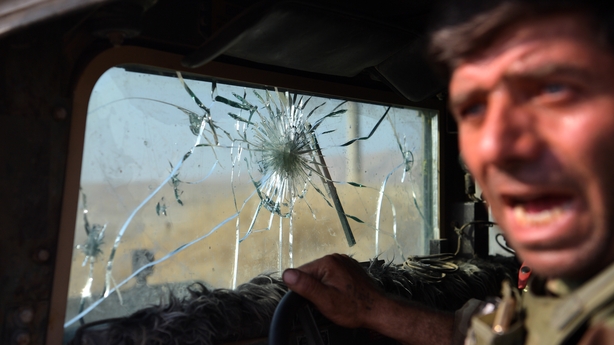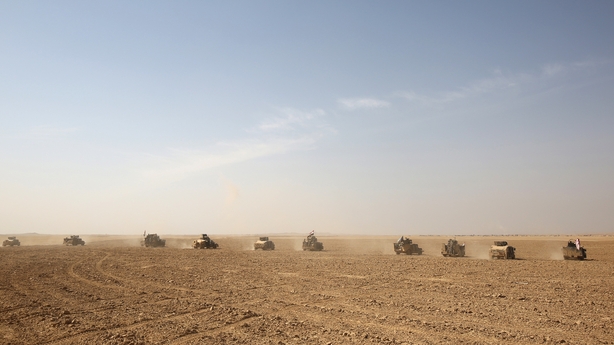Group leaders of the so-called Islamic State have been fleeing Mosul as US-backed local forces close in on the jihadists' last Iraqi stronghold, a US general has said.
US Army Major General Gary Volesky, who heads the land component command of the US-led coalition to defeat IS, predicted that foreign fighters will end up forming a large contingent of jihadists remaining in the city, as they have nowhere else to go.
An estimated 3,500 to 5,000 IS fighters are in Mosul, while tens of thousands of Iraqi forces have massed to recapture Iraqi's second city in an offensive that began on the outskirts Monday.
"We are telling Daesh that their leaders are abandoning them. We've seen a movement out of Mosul," he told reporters in a video briefing from Baghdad, using an Arabic acronym for IS.
He declined to say how many leaders had left, when they did, or where they were headed, but said they were being attacked in air strikes as they fled.
"Where they are going, I will leave that to our (missile) targeteers to take care of," Mr Volesky said.
Satellite images show the area of Mosul as the coalition forces advanced on the IS controlled city pic.twitter.com/3OM1AgqNRr
— RTÉ News (@rtenews) October 19, 2016
He noted that the Iraqis would screen anyone leaving Mosul, and attempts by foreign fighters to blend in to an expected exodus of displaced people would be thwarted.
"It's difficult for them to blend into the local population based on the number of different types of foreign fighters that there are," Mr Volesky said.
"We expect that they will be the ones (who stay and fight), because they really don't have any other place to go."
Launched on Monday, the long-awaited advance on Mosul was making quick progress, but US President Barack Obama joined a chorus of warnings that the battle ahead would be tough.
Officials have also warned that the hundreds of thousands of civilians still in the city could be used as human shields.
The US also expects IS to use crude chemical weapons as it tries to repel the Mosul offensive, although adding that the group's technical ability to develop such weapons is highly limited.
US forces have begun to regularly collect shell fragments to test for possible chemical agents, given the Islamic State's use of mustard agent in recent months, one official said.
In a previously undisclosed incident, US forces confirmed the presence of a sulfur mustard agent on IS munition fragments on 5 October, a second official said.
IS had targeted local forces, not US or coalition troops.
The fall of Mosul would signal the defeat of the ultra-hardline Sunni jihadists in Iraq but could also lead to land grabs and sectarian violence between groups that fought one another after the 2003 overthrow of Saddam Hussein.
US President Barack Obama has estimated that perhaps one million civilians are still in Mosul, creating a challenge for Iraq and its Western backers trying to expel the group through force.
"If we aren't successful in helping ordinary people as they're fleeing from ISIL, then that makes us vulnerable to seeing ISIL return," Mr Obama told reporters in Washington.
We need your consent to load this rte-player contentWe use rte-player to manage extra content that can set cookies on your device and collect data about your activity. Please review their details and accept them to load the content.Manage Preferences
We need your consent to load this rte-player contentWe use rte-player to manage extra content that can set cookies on your device and collect data about your activity. Please review their details and accept them to load the content.Manage Preferences
The International Organisation for Migration's Iraq chief, Thomas Weiss, said he expected IS militants to use Mosul residents as human shields and lent his voice to concerns about the dangers of chemical agents.
The IOM had not managed to procure many gas masks yet, despite those risks, Mr Weiss said from Baghdad.
"We also fear, and there has been some evidence that ISIL [IS] might be using chemical weapons. Children, the elderly, disabled, will be particularly vulnerable," Mr Weiss said.



